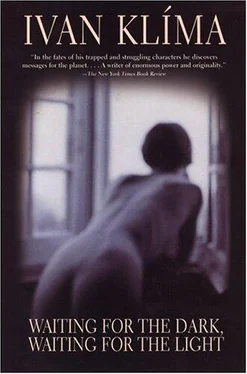take a few mouthfuls to help him swallow all the pills his doctors have condemned him to take. The nurse, or his faithful maid, always lays them out on a tray beside his glass of milk. They wait until he's put each pill into his mouth and swallowed it. Only then do they wish him a pleasant meal and withdraw. Sometimes he manages to hide some of the pills under his tongue or to shift them into the space between his teeth and his lips and then, when he is alone, he spits them into his glass of milk. But how can he know which of the pills is beneficial and which contains the slow-acting poison they are feeding him to ease him gently out of this world? How can he, when he doesn't even know which of his doctors is real and which merely one of his many executioners in disguise?
He slides his chair back from the table, gets up and walks across the soft carpet to the window. The harsh noonday sun is pouring into the garden. Two men are running a coloured bundle of cloth up a pole. He waits by the window until the bundle reaches the top, breaks open, and fills with wind. He's certain that he's never laid eyes on that kind of flag before. Two goats, or perhaps they're antelopes — at that distance it's hard to tell — face each other on a green-and-white field.
That's the sort who come to visit him. They embroider their flags with goats, elephants or monkeys and they expect him to embrace them, smile at them and be photographed with them. He should look at the map to see exactly where this president of goats comes from.
Sometimes these potentates bring him acceptable presents: lion skins, an interesting weapon, a dagger with an ivory handle or a rifle with a finely carved butt. When his wife was still alive, they would bring her magnificent fabrics, embroideries, ostrich-feather fans, shawls that she could wrap around her whole body, hairpins set with precious stones. Those who were better briefed would bring shoes or handbags made of snakeskin.
He feels like taking a look at some of those old gifts. He leaves the room and walks down an inner staircase to a hall, where he waves away a valet and goes into a room with a high, panelled ceiling and wood-panelled walls.
This is where he keeps both the gifts he likes and those he doesn't care about, gifts whose worth he cannot even guess at and gifts whose value, if any, is symbolic.
Here are glass cases crammed with marble ashtrays, boxes with mounted butterflies, busts of himself, folk carvings from the Cameroon, peasant costumes, a leather saddle from Mongolia, a grandfather clock, crystal goblets, cut-glass chalices, Chinese vases, Japanese plates and also some models: miniature machines and motors, automobiles, rockets, aircraft, spaceships, models of his residence, of factories and blast furnaces, dams and television towers, models of weapons, and, of course, real weapons as well, hunting guns both antique and modern. He stands for a while in this odd junk shop, his very own flea market. He opens one of the cases and takes out a bronze plaque and a diploma bearing an enormous seal. He stares at it for a while, ignoring the obsequious citation in which his vassals, all men of letters at a famous university, award him an honorary doctorate. Then he returns the piece of wrought metal to its bed of velvet. He leaves via the rear doors set almost invisibly in the panelled walls. He walks along a narrow corridor until he comes to a side staircase. He goes down the stairs to another room, in which the windows are covered with ornamental grilles, and the ceiling is vaulted like that of a wine cellar.
This is his room. The walls are white and bare, with no pictures or decorations, only shelves that hold his special collection of strongboxes arranged in rows. These are treasure chests, but they are empty. No coffers could contain his wealth; the entire country belongs to him. Their only value for him is that they can be opened and closed again, that he can admire and investigate their complex, precise mechanisms. Sometimes he pretends to himself that he's lost the key to one of those apparently foolproof boxes, and he has to try to break into it using the methods he was taught by the safe-cracker he shared a cell with when they were both in the hands of the executioners. Not with a blowtorch, in that barbarian way they do it in gangster films, but with fine wires and files.
Of course he collects locks as well. Brand-new locks;
locks with rusty works and complicated systems of levers that operate huge bolts; modern locks in which miniature springs trip small steel-tongues with teeth, and gears that mesh to create apparently solid elements; locks that can be opened with keys, or by setting the right combination of numbers on a dial, or by slipping a card with a magnetic band or a pattern of punched holes into a narrow slit on the face of the mechanism; locking devices that can only be activated by using the right five keys. There are combination locks in which a key can only be inserted after the proper combination is dialled, locks which trigger sirens the moment the wrong key is slipped into them. All these devices thrill him and allow him to forget his ceaseless flow of worries.
Sometimes, when he has the time to linger, he isolates himself completely from the world that surrounds him. He sits down on a round stool. In front of him, on a workbench, are boxes with labels in foreign languages, new and as yet unwrapped packages sent to him by faithful embassy employees. They understand next to nothing, of course, and they usually spend large sums of money buying out the first junk shop they come to — or sometimes they even buy them in a department store.
Impatiently, he tears the wrapping off the first parcel. A golden padlock tumbles out of the box. At first, it looks like an ordinary lock, but he cannot find the keyhole. He explores the lock carefully with his fingers. The box will certainly contain a set of instructions to help him find the opening mechanism, but he derives great satisfaction from discovering how these things work by himself.
Sometimes he imagines himself changing the locks of his residence during the night. Then he will summon the impostors that swarm around him — the doctors, the valets, the gardeners, the bodyguards, the ministers, the chauffeurs, the cooks, the secretaries and the waiters — and invite them all into one room. He will then excuse himself, leave the room and lock them in. He will also lock the door in the hall and the gate at the main entrance. Now, let them call for help, or telephone out, or shout through the window; let them break down the doors. But before they
manage to raise the alarm, he will have walked freely through the gate and vanished into the forest, and it will be a day or two before they find him.
He hears footsteps in the corridor and quickly puts the lock aside and looks guiltily at his hands. They are smeared with oil. He wipes them and then holds them behind his back.
The valet appears in the doorway. 'Comrade President, the Comrade Chancellor has arrived,' he says, his face expressionless.
'Let him wait.'
'In two hours, you must be at the airport. The Comrade Chancellor urges you. . '
'I know. Let him wait.'
They never give him a moment's peace. They have sophisticated ways of harassing him, of wearing him down. And just now, when he was ready to begin work. 'Let him wait!' he repeats. Let them all wait, including the nigger who doesn't care about meeting him anyway. All he's interested in is women, or what he might be able to squeeze out of them. They call it extending credit. Credit extended to eternity, and never otherwise. Everything we do here is forever, and meanwhile death knocks on the armour-plated gate.
He walks heavily up the side staircase.
In the library everything is spotless. Not a sign of yesterday evening. He remembers sitting here, but who was he with? They've done this to him deliberately. Whenever he drinks a little, they always remove the evidence of what he did, so he can never find out what happened, never know who he talked to, about what. On the writing-table they have arranged his briefing papers, as they always do. On top of the pile is a small note written in an unfamiliar but legible hand:
Читать дальше











